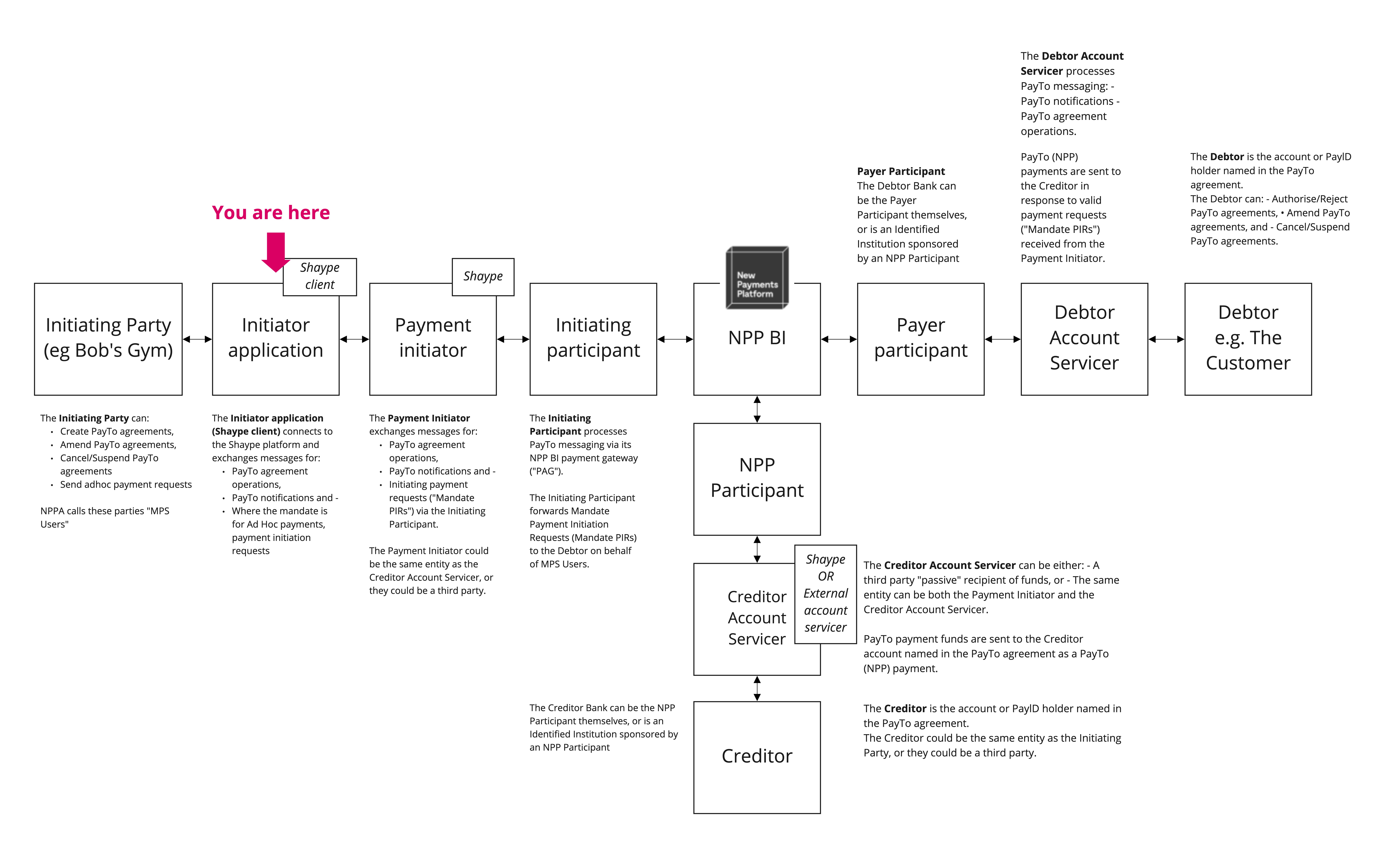PayTo
Overview
PayTo is an improvement on the existing Direct Debit function, allowing payments to be mandated and completed in real time.
NPPA background video: PayTo - Modern alternative to direct debit
For example, Person A pays for dinner then sends a mandate request with their PayID to the other 5 people. The others can accept and pay immediately. Payments can also be split out over time, allowing regular payback of debts.
Or, a gym wants to set up recurring payments with a first payment being taken on site to secure the contract. Previously this would involve a DD setup plus initial card payment. PayTo allows all this in one flow.
PayTo encompasses:
- Initiation of Payment Messages generated by third parties, to request payments from a customer’s bank account. Those payment requests are associated with a ‘mandate’ - a customer authorised payment arrangement.
- A centralised record for creating, storing and maintaining mandates. The database for this is owned and operated by NPP Australia.
- Business rules providing assurance that the payment initiation messages will be handled by the customer’s financial institution.
Key use case examples
- Instant Direct Debits. PayTo replaces the slower existing direct debits system. Batched direct debits can be subject to delays of several days – with failed payments a particular frustration. Via PayTo, money is debited, settled and cleared instantly.
- Instant payroll and disbursements. No need for large floats of cash sitting awaiting disbursement. Payroll and large supplier payment situations can benefit from instant movement of money.
- Control (where authorised) over movement of money between third parties. PayTo allows for the initiator of the transaction and the receiver of the transaction to be different entities. Unlike standard direct debits, a company could instruct funds to be taken from its customer and credit a third-party bank account without ever touching the funds themselves. For custodial services and similar, this means that you can automate transactions between accounts without third party ‘interference’.
- Alternative to expensive repeat card transactions. When confirming a regular service for customer, card has previously been the only way to secure a regular payment at the point of selling the service. PayTo allows regular payments to be set up and confirmed on the spot, meaning e.g. subscription sales can be closed reliably in person.
Shaype Capabilities – Initiator Service
The following capabilities are included in Shaype’s PayTo Initiator Services
Services
Orchestration of PayTo related notifications and messaging between our PayTo Initiator clients and the NPP Mandate Management System (MMS).
JSON APIs that provide RESTful synchronous web services that can be easily consumed by client and/or technology service provider systems, enabling Initiating Parties to:
- Create PayTo agreements (including obtaining authorisation from the Debtor),
- Amend PayTo agreements (including obtaining authorisation from the Debtor if necessary),
- Immediately Suspend, Release and Cancel PayTo agreements, and
- Execute requests for mandated payments to be made (for example an on-demand pull request triggered by the initiator application)
Operational Management Services
Shaype’s Operations Team will provide back-office support to client teams. This includes any investigations and disputes raised by clients pertaining to PayTo mandates or mandated payments.
During onboarding, Shaype works with our clients to ensure that their solution meets the rules and industry codes for Payment Initiators.
Key Roles and Terms
A PayTo agreement (mandate) is a record of payment authorisation given by a Debtor customer in favour of an NPP payment to a Creditor account.
PayTo agreements and PayTo payments involve the following key roles:
- The Debtor (the Payer account a PayTo payment is made from),
- The Creditor (the Payee account a PayTo payment is made to)
- The Initiating Party (the party that defines the PayTo agreement payment terms e.g. a merchant).
- The Payment Initiator sends the initiation request for each PayTo Payment to the Debtor on behalf of the Initiating Party. The Payment Initiator can be a payments service provider or a financial institution.
- The Debtor and Creditor Account Servicers are the financial institutions (FIs) that maintain the NPP enabled accounts/PayIDs named in the PayTo agreement.
- MPS User is a comprehensive term used to refer to any party other than the agreement Debtor.
- The Initiating Party, Creditor, and Payment Initiators are all “MPS Users”.
- Using the term “MPS User” allows for the broad range of use cases possible via PayTo.

Key relationships and interactions between parties in Shaype PayTo ecosystem
Key Scenarios
This section provides readers with an overview of the following key PayTo Payment Initiator and Initiating Party scenarios:
- View a PayTo agreement
- Creating an Authorised PayTo agreement
- All Payment Initiator clients can support the scenario where the Initiating Party is a third party to a PayTo agreement, and the Creditor Account Servicer is another organisation (i.e. the NPP payment is received by the other organisation, not the client).
- PayTo Payments (where the Payment Initiator is third party)
- PayTo Payments (where the Payment Initiator is also Creditor Account Servicer)
Check industry coverage
As of May 2023 PayTo is in a phase of partial roll-out across the industry. This means many institutions won't yet offer mandate authorisation capability to their customers. Shaype provides a service to check support for PayTo by BSB. It is recommended that you check this for your target debtor customer before sending a mandate creation request. See 'Check if BSB supports PayTo' endpoint below.
Updated 9 months ago
